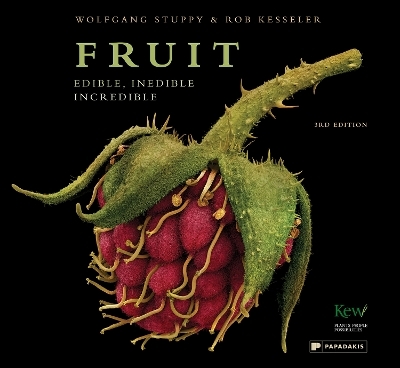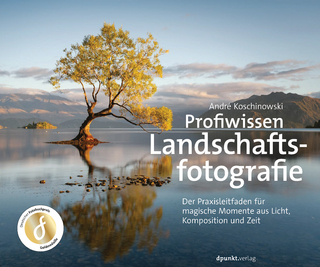
Fruit
Papadakis (Verlag)
978-1-906506-42-1 (ISBN)
Fruit. The word itself conjures up mouthwatering memories of crunchy apples, luscious strawberries, sweet bananas, succulent melons and juicy pineapples, to which we can add the splendid tropical fruits on our supermarket shelves. They are one of nature’s most wonderful gifts but providing us with a healthy source of food is not the reason that plants produce such delicious fruits. It is therefore quite legitimate to ask what fruits are, and why they exist. As will be revealed, the true nature of fruits is concealed in what is buried in their core: their seeds. The key role that both play in the survival of each species explains the manifold strategies and ruses that plants have developed for the dispersal of their seeds. Whether these involve wind, water, humans, animals or the plant’s own explosive triggers, they are reflected in the many colours, shapes and sizes of the fruits that protect the seeds and in the extraordinary way that some fruits have adapted to the animals that disperse their seeds, and the animals to the fruits they relish. In this pioneering collaboration, visual artist Rob Kesseler and seed morphologist Wolfgang Stuppy use scanning electronmicroscopy to obtain astonishing images of a variety of fruits and the seeds they protect. Razor-sharp cross-sections reveal intricate interiors, nuts and other examples of botanical architecture and reproductive ingenuity. The black and white microscope images have been sumptuously coloured by Rob Kesseler highlighting the structure and functioning of the minuscule fruit and seeds some almost invisible to the naked eye and in so doing creating a work of art. Larger fruits, flowers and seeds have been especially photographed. The formation, development and demise of the fruits are described their vital role in the preservation of the biodiversity of our planet explained. Fruits are the keepers of the precious seeds that ensure our future; some are edible, others inedible and many, quite simply, incredible.
Wolfgang Stuppy is the seed morphologist for the Millennium Seed Bank Project at the Royal Botanic Gardens, Kew. At the heart of this large international project, which collects and stores seeds and fruits from all over the world, Dr. Stuppy has found the ideal environment to feed his passion for research into the astonishing diversity of seeds and fruits. Rob Kesseler is a visual artist and Professor of Ceramic Art & Design at Central Saint Martins College of Art & Design. Collaborating with scientists, his work inhabits a territory where design, fine art and applied art overlap. From 2001–2004 he was NESTA Fellow at Kew and continues to work with Wolfgang Stuppy on an examination of microscopic plant material. He is a Fellow of the Linnean Society and of the Royal Society of Arts. In 2010 he was appointed Research Fellow at the Gulbenkian Science Institute. His work has been exhibited around the world.
Preface by Ken Arnold
Foreword by Stephen D. Hopper
Fruit – Edible, Inedible, Incredible
What is a Fruit?
What is a fruit and what is a vegetable?
Angiosperms, Gymnosperms and those that copulate in secret
The naked-seeded ones
The non-naked-seeded ones
An abominable mystery
Angiosperm extremists
No Flower, no Fruit?
Is a pine cone a fruit?
No Carpel, no Fruit?
A shameless display
Not quite the ovary of Eve
Unwitting couriers
Wind, sex and gender separation
What’s in a Fruit?
Babylonian confusion
Enhanced female performance
How to be a carpologist
The true meaning of fruits
Simple Fruits
The truth about berries
The miraculous miracle berry
Golden apples
Fragrant citrons
Buddha’s hand
Sizeable pepos
Soft shell, hard core or how to be a drupe
Nuts about nuts
Walnuts or waldrupes?
Glans quercus
Two fruits in one – cashew nut and cashew apple
Wheat “grain” and sunflower “seed” – caryopsis and achene
Samaras – nuts gone airborne
Cypselas – achenes gone airborne
Pods and such like
Capsules or seven ways to open a fruit
Teeth, fissures, cracks and lids
Follicle and coccum
Pods as in “pea pods”
Sweet bean pods
The World’s largest bean pod
Seeds in prison
Inside-out drupes
To be or not to be a drupe
Multiple Fruits – Several fruitlets from a single flower?
Schizocarpic Fruits or how to emulate the multiple experience
Anthocarpous Fruits – the carpologists’ touchstone
Compound Fruits – A single fruit from several flowers?
The breadfruit and the Mutiny on the Bounty
The largest fruit a tree can bear
Figs, gnats and sycophants
Angiosperms with cones?
Carpological Troublemakers
Bogus fruits and how to debunk them
So what is a Fruit?
The biological function of fruits and seeds
Dispersal – the many ways to get around
Wind dispersal
Wings
Monoplanes
Flying discs
Spinning cylinders
Shuttlecocks
Woolly travellers
Love-in-a-puff and other balloon travellers
Anemoballism
Water dispersal
Dispersal by raindrops
Plants that do it for themselves
Hygroscopic tension
Hydraulic pressure
Animal Dispersal
Becoming attached
The story of the sadistic Tribulus
In the claws of the devil
How to catch a bird
Dispersal by scatter-hoarders
Dispersal by ants
Combining Strategies
Directed Dispersal
Fleshy Fruits
The evolution of fleshy fruits
The good, the bad and the ugly, or why fruits are poisonous
Enough is as good as a feast
Young and dangerous
Climacteric fruits
One bad apple spoils the barrel
Dispersal syndromes, the sign-language of fruits
The bird-dispersal syndrome
How to catch the eye of a bird
Fleshy seeds
Flashy seeds
Dangerous beauty
Colourful appendages
Arillate seeds and the fate of New York
Dispersal by mammals
The bat dispersal syndrome
Monkey fruits – the primate-dispersal syndrome
Monkey apple
The Queen of Fruits
Cacao – food of the gods
The baobab
Durian – the King of Fruits
A big fruit needs a big mouth – the megafaunal dispersal syndrome
Africa’s large mammals and their fruits
Sausages that grow on trees
Fruits that only elephants like
When the elephants are gone
The aardvark and its cucumber
Mallotus nudiflorus and the Indian rhinoceros
The nitre bush and emus
Galápagos tomatoes and giant tortoises
More inseparable couples
Till death do us part
The dodo and the tambalocoque – a textbook fairy tale
Anachronistic fruits
Size no longer matters
The largest fruit of America
Osage orange
How can it be true?
Where have all the mammoths gone?
The Millennium Seed Bank Project
Lusciousness – The crafted image in a digital environment
Appendices
Glossary
Bibliography
Index of Plants illustrated
Footnotes
Picture Credits
Acknowledgments
| Erscheint lt. Verlag | 1.6.2024 |
|---|---|
| Reihe/Serie | Seeds / Pollen / Fruit |
| Zusatzinfo | 1 Illustrations, black and white; 264 Illustrations, color |
| Verlagsort | Newbury |
| Sprache | englisch |
| Maße | 200 x 220 mm |
| Gewicht | 1214 g |
| Themenwelt | Kunst / Musik / Theater ► Fotokunst |
| Sachbuch/Ratgeber ► Freizeit / Hobby ► Fotografieren / Filmen | |
| Sachbuch/Ratgeber ► Natur / Technik ► Natur / Ökologie | |
| Naturwissenschaften ► Biologie ► Botanik | |
| ISBN-10 | 1-906506-42-6 / 1906506426 |
| ISBN-13 | 978-1-906506-42-1 / 9781906506421 |
| Zustand | Neuware |
| Informationen gemäß Produktsicherheitsverordnung (GPSR) | |
| Haben Sie eine Frage zum Produkt? |
aus dem Bereich


